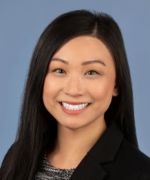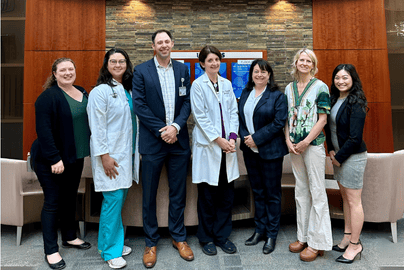Facilities
University of California at Davis and UC Davis Medical Center
The University of California at Davis enrolls over 30,000 undergraduates and 7,000 graduate students on its 5,200-acre main campus. It has extensive library and computing resources that provide in-depth coverage of many academic fields. The affiliated Medical School maintains its academic resources with a 665-bed teaching hospital in Sacramento for over 1,500 students in the Health Sciences. Our program is jointly supported by the Neurology Department and the UC Davis Alzheimer's Disease Center. A major clinical site of our program is the Neuroscience Clinic in the Neurology Department at the Campus Commons and Midtown Clinic locations. Other specialties at the Campus Commons location include cognitive behavioral neurology and social work. Most neuropsychological services provided by the Department of Neurology occur in this setting, but a few select services may occur at different locations. Fellows in our program may also have the opportunity to work with professionals from other clinical departments (e.g. Neurological Surgery, Pain Management, Geriatric Medicine, etc.) and academic centers, such as the UC Davis Center for Neuroscience. Our fellows also have access to the combined resources that support the scientific and medical communities of UC Davis, including libraries, computers, and technical and research support staff.
Department of Neurology
The UC Davis Health Department of Neurology has several specialty areas including but not limited to: Alzheimer's Disease and Dementia, Child Neurology, Comprehensive Neurology, Epilepsy, Headaches, Movement Disorders including Parkinson's Disease, Neuroimmunology including Multiple Sclerosis, Neuromuscular Conditions, Neuro-oncology, Neuropsychology, Sleep Disorders, Stroke, and Traumatic Brain Injury.
UC Davis Health Deep Brain Stimulation (DBS) Program
The UC Davis Center for Movement Disorders and Neurorestoration is recognized as a Parkinson's Foundation Center of Excellence for our expertise in clinical care for patients with Parkinson's disease. The center is one of 54 worldwide to receive the prestigious designation. A Parkinson's Foundation Center of Excellence is a medical center that brings together a specialized team of neurologists, movement disorder specialists, rehabilitation professionals, mental health experts (including neuropsychologist), and others with extensive knowledge in Parkinson's Disease (PD) medications, treatments, and research. Their collective expertise enables them to provide top-quality care for individuals with PD. Our DBS Program offers surgical treatment for PD and other movement disorders including but not limited to essential tremor and dystonia. We have DBS case conferences to review candidacy of potential DBS patients, which includes reviewing pre-operative neuropsychological testing, neuroimaging, clinical history, and ON/OFF motor testing. This is a multidisciplinary team with neuropsychologists, movement disorder neurologists, movement disorder nurse practitioner, neurosurgeons, and our social worker.
UC Davis Comprehensive Epilepsy Program
UC Davis is a NAEC Level 4 Epilepsy center for both adult and pediatric populations, making it a hub for epilepsy care in Northern California (as far as the southern Oregon border) and Western Nevada. Our epileptologists provide clinical services to patients and also manage extensive research programs exploring etiological considerations for epilepsy syndromes, cognitive and psychiatric co-morbidities of epilepsy, and effective medical and surgical treatments for epilepsy, many of which are NIH funded. UC Davis also has a 7-bed inpatient Epilepsy Monitoring Unit (EMU), equipped with video EEG technology (both scalp and depth electrodes) and electrical stimulation devices for in-depth monitoring of patients' seizures. There is close collaboration with Neurosurgery faculty as well, as UCD is one of the few centers in Northern California that offers more extensive stereo-EEG monitoring and advanced surgical treatments for epilepsy (e.g., neuromodulation, laser ablation, stem cell therapy trials, etc.). We have epilepsy case conferences attended by the epilepsy faculty along with faculty from Neurosurgery and Neuroradiology to discuss upcoming surgical cases. At times, additional pre-surgical assessment is indicated (including fMRI, Wada exams, and language mapping). These procedures require interdisciplinary collaboration with our physician colleagues and are great learning opportunities while on fellowship.
The California Alzheimer's Disease Center (CADC)
The UCD State of California Alzheimer's Disease Center (CADC) is a statewide network of ten dementia care Centers of Excellence at university health systems, established by legislation in 1984. The CADC effectively and efficiently improve dementia health care delivery, provide specialized training and education to health care professionals, and advance the diagnosis and treatment of Alzheimer's disease and dementia. Our mission is to deliver state-of-the-art preventative, diagnostic, and supportive services for individuals who are experiencing or are at risk of memory loss, Alzheimer's disease, and other disorders, as well as to provide support to their families and caregivers. In addition to neurological and neuropsychological services, we have a social worker that works directly with the program and is available for referrals. Other support services include a New Diagnosis Class and the Caregiver Bootcamp, a five-class series offered two to three times per year. The CADC also provides education related to Alzheimer's disease to health care professionals and to the community.
The UC Davis Alzheimer's Disease Research Center (ADRC)
The UC Davis ADRC is a National Institute of Health (NIH) funded research center. It has been funded by the NIH for over 30 years. As part of the center, a group of ~500 older adults are followed longitudinally and assessed yearly. There are many ancillary studies, including many RO1s, K Awards, and other NIH funding mechanisms that the center also supports. Various center research themes include the impact of diverse backgrounds, lifespan risk, and protective factors on cognitive aging; understanding the behavioral, cognitive, and functional changes that occur with various dementias; neuroimaging and biomarker development; functional decline; cognitive reserve; and medical and behavioral interventions to promote healthy aging and reduce risk of and/or treat Alzheimer's disease and related disorders. Some studies involve clinical trials of potential new treatments, or ways of preventing cognitive loss. The Alzheimer's Disease Center's longitudinal aging cohort includes a large portion of individuals representing a variety of ethnic/racial minorities.
The UC Davis Center for Neuroscience
The UC Davis Center for Neuroscience draws from a wide variety of resources to conduct its teaching and research programs. Contributing to this interdisciplinary approach are Center faculty members, students, and collaborators who represent 13 academic departments and sections on the main campus and a number of off-campus sites. In addition, visiting faculty members from throughout the world bring outstanding talent to the Center's programs.
Research at the Center ranges from single-cell recordings and studies of neuronal populations in isolation, to studies of human perception, attention, memory, language, and the nature of consciousness. The center places special emphasis on combining information obtained from different brain-imaging techniques, including fMRI, PET, and ERPs, to develop improved methods to treat brain injury and disease.
Populations Served
Our service is primarily an adult neuropsychology service, but there is a limited pediatric service that mostly sees patients under the age of 16 for pre-surgical epilepsy evaluations and/or other neurological conditions.
Fellows will have the opportunity to see patients through our Neuroscience Clinic and Alzheimer's Disease Center. The majority of the referrals come from the Neurology, Neurosurgery, and Primary Care Departments and include a wide range of neurological disorders, including stroke, brain tumor, head injury, epilepsy, multiple sclerosis, systemic lupus erythematosus, Parkinson's disease, Huntington's disease as well as a range of neurogenerative disorders. Fellows will have the opportunity to do pre- and post-surgical evaluations of candidates for surgical treatment of epilepsy (including resective, laser ablation or neuromodulation surgeries) as well as deep brain stimulation (DBS) surgery for movement disorders. Additional training opportunities include participation in 'Wada' examinations and participation in intra-operative and extra-operative language mapping.
 Fellowship Program Director
Fellowship Program Director

